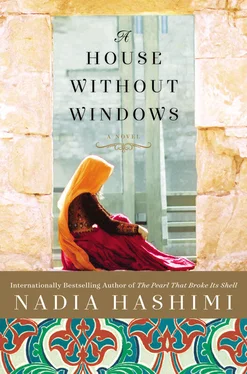“My clothes?” Zeba asked with surprise.
“Now, that’s an offer worth considering. I’d move her request, whatever it is, to the top of the list. But that’s just me,” Latifa said. She was standing at the television, turning the dial to flip through the channels. When she came to the TOLO channel, she stopped abruptly and clapped her hands together. Zeba and the three women still waiting to talk to her all turned their attention to the television.
“It’s the finals! They’re going to announce the winner today,” she exclaimed. “How could I have forgotten?”
Two young men stood on a stage, microphones clutched in their nervous hands as they shifted their weight from foot to foot. They were being judged by a colorful panel of three men and one woman, some of Afghanistan’s biggest names in the music world. One man wore a tuxedo, the two other men wore butterfly-collared dress shirts under jackets, their necks adorned with bold silver jewelry, the kind only musicians could pull off. The woman, with heavily darkened eyes, wore a beige, glimmery long-sleeved shirt and layers of thin gold necklaces. Her inky, black locks cascaded over her shoulders and acted as a backdrop for her dangling gold earrings.
Her name was Fariha and she was everything the women in prison were not. She was bejeweled, sitting in a room full of men. The audience revered her voice. She leaned back in her chair with the comfort of an unchallenged ruler, sparkling as she congratulated both contestants on their tone, emotion, and range. Rubbing her hands together and lowering her smoky eyelids, she announced: “I choose. . Isah- jan as the winner!”
The camera panned to Isah, a young man with curly hair and a sheepish smile. The host of the show lifted Isah’s left hand into the air triumphantly. The audience, young men in their twenties, stood and clapped wildly.
“Isah!” Latifa cried. “I knew he would win. He’s the best by far. You know he’s from the same town as my mother.”
“Oh really? My congratulations to your whole family, then,” Nafisa mumbled. She sat cross-legged in front of her bed, flipping through a beauty magazine.
“Zeba- jan, ” the woman went on. “As I said, I’ll take care of your laundry if you can help me get out of here before my boys turn seven and they’re taken away from me.”
Somehow, the fact that they were twins made them seem even more forlorn.
“How old are they now?” Zeba asked, touching the top of one boy’s head. The prison was home to enough children that walking through its halls sometimes reminded Zeba of an elementary school.
“Six, and the guards have already started talking about sending them to the orphanage with the others,” the woman said, her voice cracking. “I can’t be away from them. I’ve only survived this long because they’ve been here with me.”
“You’ve been here seven years?”
She nodded. She was younger than Zeba and had the freshness of an adolescent. But judging by the ages of her boys, she had to be in her early twenties.
“Why are you here?”
Latifa was glued to the television. The winner of the competition, Isah, was singing his victory song. The audience was clapping in time, cheering him on. Fariha moved her shoulders to the rhythm and nodded in approval.
The young mother looked at her boys and then around the room. She spoke so softly that even Zeba had to lean in and pay close attention to make out her painful story.
“I was attacked by my cousin at my home. He cornered me in a room and told me he would kill me if I screamed. My family didn’t believe me and when I went to the police, they arrested me.”
“They arrested you?”
“No one had seen or heard what had happened. The police said if it had been forced, I would have screamed. Since I hadn’t shouted, they arrested me for zina . I was already in prison when I realized I was pregnant. Once my family found out about that, I never heard from them again.”
The boys were watching Zeba, looking for her reaction. She forced a quick smile their way. They’d heard the story before, she could see.
“Because you didn’t scream. .” she echoed. The words rattled her. “But you didn’t scream because you were scared?”
“He had a knife,” she said plainly. Zeba sensed these were words she’d said a thousand times before to no avail.
Zeba rubbed at her eyes. The stories were too much for her. There was no way her jadu would free a prison full of condemned women. No spell would change the fact that a woman’s worth was measured, with scientific diligence, in blood. A woman was only as good as the drops that fell on her wedding night, the ounces she bled with the turns of the moon, and the small river she shed giving her husband children. Some women were judged most ultimately, having their veins emptied to atone for their sins or for the sins of others.
“You’ve said nothing about wanting to be released,” Zeba remarked. “You just want the boys to stay with you?”
“Released?” She laughed lightly and shook her head. “Not at all. I don’t know what I would do if I were turned out. My family will not take me back. I have no friends to take me in. I have two boys and a story no one wants to hear or believe. The boys will be sent out when they’re seven, and even though they are what they are, I can’t. . I can’t imagine being in here without them.”
The boys flinched. Their mother’s lower lip quivered.
Latifa was flipping the channels again. Nafisa pretended to turn a page but was looking past the magazine at the woman with her two boys. She looked relieved not to be in her place. Zeba hated sending every woman away with nothing but a promise, so she undid the taweez she had safety-pinned to the breast pocket of her dress. The needle pricked her finger and drew a spot of blood. Zeba wiped it on her own skirt and pinned the taweez her mother had gotten from Jawad to the inside of the young mother’s collar.
“Take this for now. I will think very carefully about what can be done,” Zeba promised. Even as she spoke the words, she could hear how hollow they sounded.
THE NEXT TWO DAYS BROUGHT MORE OF THE SAME. THE STREAM of women grew steadier. They followed Zeba into her cell or found her in the yard or approached her in the hallways. Zeba was not accustomed to so much attention. They clasped her hands between their own. They brought her small hand mirrors or tubes of lipstick. They offered to wash her hair or to allow her to use their contraband mobile phones, which wouldn’t have done her any good. Kamal’s sister did not have a phone and, even if she had, likely would not have answered her call. Zeba tried to refuse the gifts and favors though some were left anonymously on her bed or done before she could protest. If bribery was practiced in the outside world, it was perfected in the prison.
“I HAVE A SIMILAR PROBLEM, BUT IT INVOLVES MY HUSBAND AND his new bride. He had me locked up in here so he could get married without me in the way. Tonight’s their wedding, and I want to do something to make him limp as a noodle.”
Another woman was elbowing her way into the room.
“I’m not trying to ruin anyone’s life. I have a simple request. My hair’s been falling out in clumps since I’ve been here. Look here, sister. Just look at this!”
She lowered her head before Zeba and let her head scarf slip down to her neck. She raked her fingers through her hair, showing large patches of white scalp.
“I’ve tried washing it with red mud. I’ve tried rubbing raw eggs on my head. My sister even brought me a bottle of hair oil from India, but nothing’s worked. You must know something that will help my hair — please!”
Zeba turned to Latifa and sighed heavily.
Читать дальше











